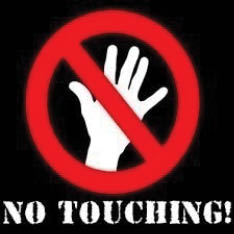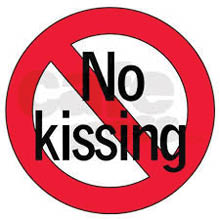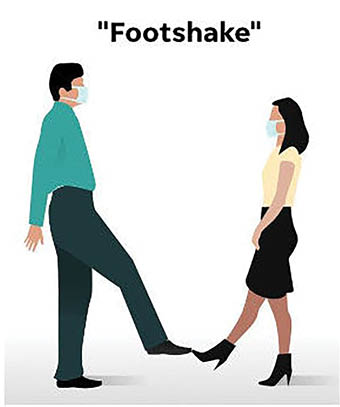Veera is a published Author (‘Endured’ and ‘#LoveBitesLifeHacks’) and Columnist; a passionate Educator and Counsellor; Poet and Philosopher… but most of all, a lover of all things literary.
The way humans behave in society is based largely on the rules of etiquette one tends to follow. The original social manuals of Western civilization were in fact success manuals. In the Middle Ages, knights and nobles followed stringent rules and proper forms of conduct in the courts of kings, which is where the concepts of ‘courtly’ and ‘courtesy’ sprung up.

We live in a civilized world where most of our associations boast of tasteful and civilized friends and colleagues. Right from kindergarten, we pick up behavioural rules through association and fealty, soon learning to dance socially, by always putting your best foot forward. In the words of Freud, “It is impossible to overlook the extent to which civilization is built upon a renunciation of instinct.” Over time and learnt patterns of behaviour, you’ll soon see a common denominator in the way people conduct themselves socially… Think about other people’s feelings first before maximizing your own personal convenience. The more correctly and generously you adapt to this maxim, the higher you climb the charts of popularity. Soon you are viewed as a worthy friend, a gracious host, a welcomed guest and sometimes, even a notable acquaintance.

We shake hands, we hug, we greet each other with a passing nod or a good morning, you wait for the lady to take the chair before seating yourself, you pull open doors, you let another pass before entering… but good manners and customs the world over are just as different as the people who show them. Eskimos rub noses in greeting, the Japanese take off their shoes before entering a house, the Thai never display the soles of their shoes – it’s considered highly inappropriate; in Russia, you do not shake hands before entering the room first or never intentionally turn your back on people.
In Italy while it is generally considered polite to allow a woman to go through a door first, the rule simply doesn’t apply to restaurants, where it’s considered proper for the man to lead, so he could be the one to talk to the host and procure a table. In Italy, it’s also rude to ask for a sprinkling of Parmesan cheese on your dishes, downright rude especially on your pizza! Here, cheese is incompatible with pizza the way ketchup is with fish! In India, traditionally, you neither hug nor shake hands, a namaste is the norm to welcome or greet others. To eat with your left hand is considered unhygienic here.

Post the novel coronavirus scare, a lot has changed. These uncertain times call for new etiquettes and rules that can be complex to navigate. After all, you don’t want to be rude… but you also don’t want to put your safety at risk or potentially harm others. Who would have ever thought that a handshake could be a dangerous thing and that the need of the hour is a germ-free gesture! Coughing in public is now equivalent to detonating a grenade; yawning in public was impolite earlier, but now it will be frowned upon!
Common in our country – spitting is a habit always viewed as offensive and disrespectful to an onlooker, but in the given times, this bad habit is a growing cause for concern. Sharing food is a complete no-no! So sharing fries or passing that dessert around is no longer acceptable. Clinking glasses for a toast or saying hello with a kiss, especially Europeans who deploy two upon first meeting someone, will probably be a thing in the past. Offering to carry packages or groceries – basically offering a helping hand – is no longer an option, at least in these complicated times.
These days, it’s about being more than well mannered and considerate. It’s all about being hygiene-conscious and saving lives. Not surprisingly, many countries habituated to their customs, are now reconciling and rolling with the punches, post the corona scare. New, tailor-made gestures and greetings are springing up along the way, along with Social Distancing. Saying no to a handshake, refusing every peck on the cheek and definitely avoiding hugging is changing habits around the world at work, home and in worship.
Your hands are now viewed as the petri dishes of bacteria and viruses; handshakes will soon be considered passé, much like bowing and curtsey is in our modern times. In France, newspapers are filled with advice on replacing kissing on the cheek – an everyday greeting there with simply be looking into one another’s eyes. Brazil’s Health Ministry has recommended that citizens not share metal straws used to consume their Chimarrao – the caffeine-rich South American drink mate. No matter how cute those selfies look, sharing straws, spoons or forks is a potential health risk.

The outbreak could hit one of Spain’s most cherished traditions – the kissing of the sculptures of the Virgin Mary. Romania’s Martisor festival marks the beginning of spring, when talismanic strings of flowers are handed out, often from men to women, with an accompanying kiss. While the handing out of flowers will still be permitted, the kiss will see a different fate. In Poland, one of Europe’s most Catholic countries, the faithful are allowed to take ‘spiritual communion’ instead of consuming the communal bread – it can be taken in the hands rather than the mouth. The faithful have also been asked not to dip their hands in holy water when going in and out of church.
In India, there was a complete ban on places of worship – so there were no congregations in temples, mosques, churches and our fire-temples. In Beijing, the capital of the country where the outbreak began, red hoardings everywhere tell people not to shake hands but to join them in a sign of greeting. Loudspeakers tell people to make traditional gong shou gestures – a fist in the opposite palm – to say hello and acknowledge another. In Iran, a video has gone viral of three friends meeting – hands in their pockets, tapping their feet against each other as a greeting.
Could the foot shake be the new handshake? Will the best smile alternative probably be the good old fashioned thumbs up? Masks are here to stay and are not going anywhere, anytime soon. New etiquette rules in a COVID-19 world may dictate that it’s easier to err on the side of caution, rather than take any undue risk and these may well be the norm till 7.8 billion people globally feel safe again in a COVID-free world!
- Romantic Love – Win Some, Lose Some! - 8 February2025
- Right Over Wrong Every Single Time! - 25 January2025
- End Of Year Reflections And New Year Hopes - 28 December2024
